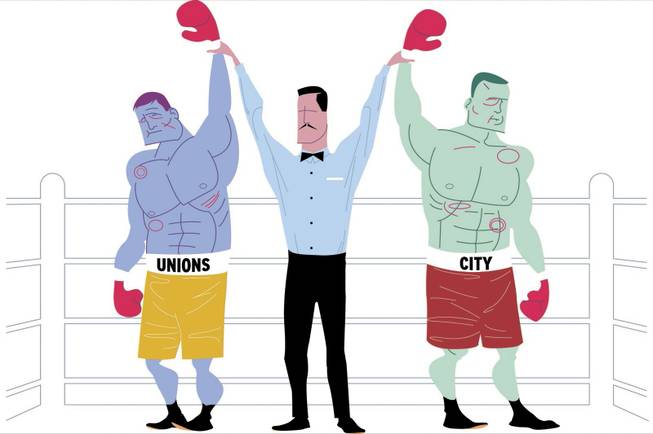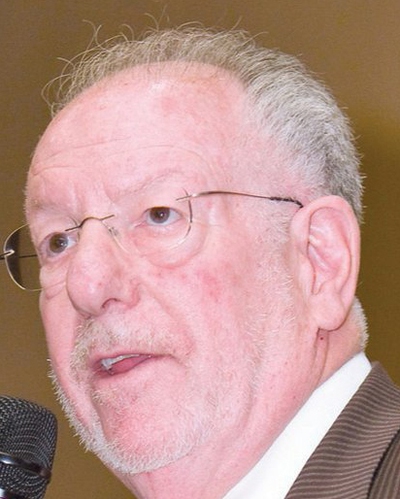Saturday, Nov. 28, 2009 | 2 a.m.
Sun Archives
The proposed peace pact between Las Vegas and the Culinary Union — until recently the most intractable of political enemies — appears to offer a victory to both sides.
Yes, the Culinary lost in the sense that it has been unable to stop the new city hall project the union has claimed is a significant waste of taxpayer dollars.
But the union has all along had another, arguably more significant, goal — ensuring that workers at future downtown hotels and casinos have the right to have the union represent them.
On that count, through the agreement’s “labor peace ordinance,” the Culinary clearly won.
The goal of city leaders through this yearlong ordeal was simpler. Led by Mayor Oscar Goodman, they were working to quash any effort to hinder downtown redevelopment plans generally, including the new city hall.
By those standards, the city also clearly won.
Some City Council opposition remains, but on a final vote at the council’s meeting Wednesday the project is expected to pass.
There’s nothing in the Culinary-city pact — known as a “Memorandum of Understanding,” also up for a vote Wednesday — that would give the union the right to put the kibosh on future city development plans or even limit the size of the city’s Redevelopment Agency.
“This does seem to be a win-win,” said UNLV law professor Steve Johnson, who has followed the issue from the start. “Both sides can deservedly feel good about this outcome.”
If approved, the agreement will bring an unlikely peace to a dispute marked by harsh words, ballot initiatives and court battles.
Johnson said the Culinary was smart to look at the issue with a “wide-angle lens” — although it had issues with the new city hall project, it was able to use that fight to reach other goals, including the labor ordinance with the city.
Last week, the Culinary also inked a memorandum of understanding with Cleveland-based Forest City Enterprises, the developer the city is working with on a hotel and casino for Symphony Park.
Forest City spokesman Jeff Linton said the Culinary’s deal with his company is similar to the union’s deal with the city in guaranteeing the right of workers to unionize.
Linton said Forest City held behind-the-scenes negotiations with the Culinary for more than a year. He declined to provide a copy of the agreement or to share details.
The agreement between the city and the Culinary spells out a rather clear quid pro quo: The Culinary may unionize future resorts downtown and, in return, it agrees not to picket or strike or sue the city.
Despite virulent past disagreements, the pact states that “all parties believe it in their mutual best interest to reach agreement in an amicable and positive manner, such that the parties may mutually support each other in key endeavors such as the City Hall project and labor peace agreements so that economic expansion may continue to the benefit of workers and citizens in the City of Las Vegas.”
The pact would mandate passage of a “labor peace ordinance” pertaining to future gaming hospitality projects in which the city has a financial interest.
Clearly the union had one such project in mind. If and when the city hall is completed, the city would swap 6.5 acres of adjacent Symphony Park land to Forest City in return for the 2.7 acres beneath the new city hall. The developer then will be obligated to start construction of a resort on that park site within five years.
Such an agreement between the city and the Culinary would in essence mandate that Forest City allow the Culinary to represent the project’s hotel workers — in return for agreeing not to strike or picket the project.
The agreement also would mandate that the union “refrain from pursuing any further lawsuits, initiatives or referenda regarding opposition to city hall, the (Redevelopment Agency) or related matters.”
The seven-pronged pact would allow a Citizens Advisory Committee to be formed to provide input on future Redevelopment Agency projects. In addition, the Culinary agreed not to lobby the Legislature on legislation affecting the city’s redevelopment projects except when both parties agree that the union’s involvement would “further the interest of a balanced and successful redevelopment process.”
The pact also would mandate that the city work with the Clark County School District to make sure schools have a “mechanism of support” when future redevelopment plans are considered.
The five-year agreement could be extended for up to four years if both parties agree.
City Manager Betsy Fretwell said in an interview that negotiations between the parties were ongoing for months before a final agreement was reached. The city is pleased that potential hindrances such as union-sponsored lawsuits and ballot initiatives have been taken off the table, Fretwell said.
“This gives us a greater sense of stability for the RDA as we move forward,” Fretwell said.
In a written statement, D. Taylor, the Culinary’s secretary-treasurer, said he also was satisfied with the agreement.
“We are pleased the city is making steps towards improving its process and we think the agreement signals that in the future there will be meaningful dialogue in the redevelopment process,” Taylor said. The memorandum “addresses our key concerns and ensures citizens will have a voice when tax dollars are involved and city services and schools are affected,” Taylor said.
The new city hall project is part of a $1 billion-plus downtown redevelopment plan that includes the possible Symphony Park resort, sports arena and entertainment district, new office buildings and the mob museum.
The plans are considered among the biggest legacies of Mayor Oscar Goodman, who once referred to Taylor and other Culinary leaders as “evil” for opposing his plans.
The Culinary in January filed petitions for two ballot questions. One, a referendum, would have prevented the city’s redevelopment agency from authorizing new projects. The other, an initiative, would have forced the city to gain voter approval for “lease-purchase” agreements worth more than $2 million — a measure aimed directly at Goodman’s city hall plans.
Both measures were approved for the June 2 ballot by the city clerk’s office, prompting the City Council to strip them from the ballot. The Culinary then filed a complaint with Nevada Supreme Court to have the measures reinstated. The union lost its court fight.
Meanwhile, the parties engaged in sporadic negotiations to find peaceful middle ground.
Those talks started last December, before the Culinary’s petitions were filed. By early March, when the city dumped the measures from the ballot, talks had ceased.
At some point they resumed, though neither Fretwell nor a Culinary spokeswoman would provide details.
Taylor has said that during his December discussion with Goodman, he presented a list of the union’s wishes to the mayor. In some regards that list mirrors the pact the City Council is set to approve next week, including the citizens panel.
But the union failed to extract one big, hoped-for concession — that the city would agree not to expand the size of the redevelopment area.




Join the Discussion:
Check this out for a full explanation of our conversion to the LiveFyre commenting system and instructions on how to sign up for an account.
Full comments policy